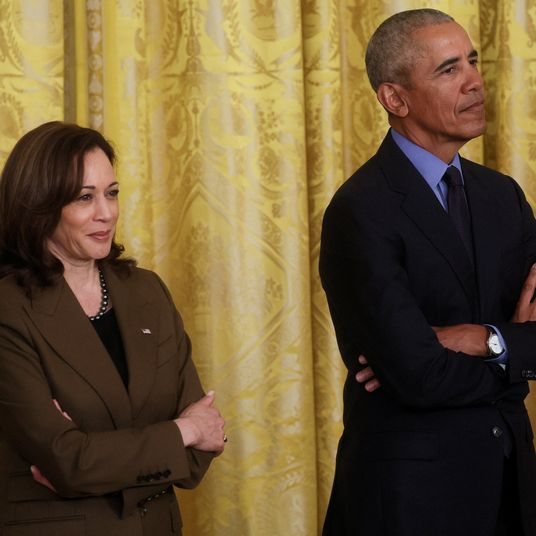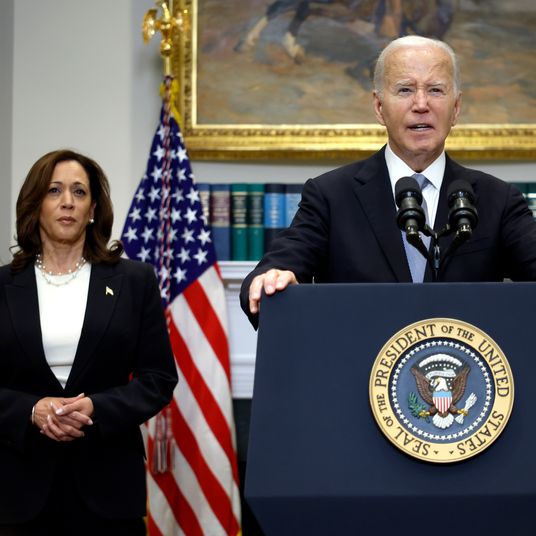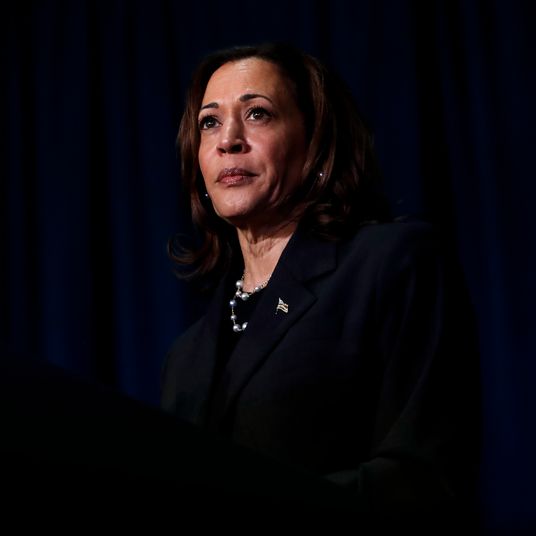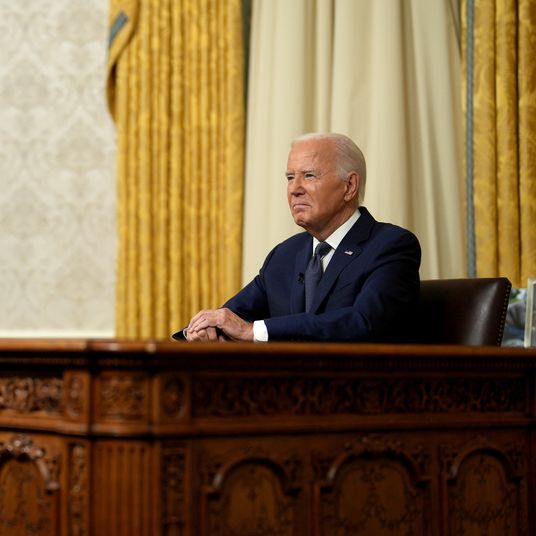
The debate in the United States, and more specifically within the Democratic Party, over the Israel-Hamas War has mostly focused on the question of whether Israel should accept a cease-fire that more or less ends the war without its goal of destroying Hamas’s military capabilities having been met. According to most polls, a majority of Americans favor such a cease-fire, citing the horrific ongoing humanitarian disaster in Gaza. President Biden has not agreed; nor have a majority of Democratic members of Congress; nor have virtually any Republicans, who mostly seem to worry Israel has not been lethal enough in dealing with Palestinians generally.
But the Biden administration’s solidarity with the current Israeli government has recently frayed thanks to Bibi Netanyahu’s total rejection of Biden’s demand that Israel aim at the restoration of Palestinian authority over Gaza (along with the West Bank) once the war is over. Israelis may presently have a higher opinion of Biden than of their own prime minister, but Bibi is nonetheless staking his governing coalition on the most definitive opposition to an ultimate two-state solution he can muster, after many years of opportunistic equivocation on the subject. It’s been obvious for a while that Netanyahu is trying to keep his right-wing government together by triangulating against the U.S., as Noga Tarnopolsky reported at New York last month:
Netanyahu has openly defied the U.S., by far Israel’s most important ally, on every war-related issue except the goal of eradicating Hamas. He declared that Israel would retain “security control” for Gaza “indefinitely,” leading Biden to say occupying Gaza would be “a big mistake.” Secretary of State Antony Blinken also underscored that there should be “no reoccupation of Gaza after the conflict ends. No attempt to blockade or besiege Gaza. No reduction in the territory of Gaza.”
The back-and-forth has continued since then, with Netanyahu going out of his way to rule out the preferred long-term strategy for Gaza’s self-governance that Biden has proposed, as The Wall Street Journal reported last week:
Israeli Prime Minister Benjamin Netanyahu on Tuesday rejected the Biden administration’s postwar plan to have the Palestinian Authority take over Gaza, the sharpest sign of his pushback against the U.S. blueprint for administering the enclave after the invasion ends.
“After the great sacrifice of our civilians and our soldiers, I will not allow the entry into Gaza of those who educate for terrorism, support terrorism and finance terrorism,” Netanyahu said, referring to the Palestinian Authority, which currently oversees parts of the West Bank, in a statement Tuesday.
“I will not allow Israel to repeat the mistake of Oslo,” he added, a reference to the 1993 agreement that established the Palestinian Authority and which Netanyahu has long criticized.
“Oslo,” of course, and the peace process it represented, aiming at a two-state solution, was the cherished and never-repudiated project of Democrats like Joe Biden. So the longtime tensions between most U.S. Democrats and right-wing Israelis on this subject were only submerged by the emergency of the Hamas attacks on Israel. They clearly haven’t gone away, and so long as Bibi maintains his grip on a governing coalition by suggesting a permanent Israeli occupation of virtually all of Palestine, the tensions will grow worse at the very moment when Israel depends on material and diplomatic support from Washington.
The question for the United States now is what Biden is prepared to do other than criticize Bibi. The logical next step, if he is willing to take it, has been laid out by his longtime frenemy Bernie Sanders, who has made it clear he will not support an imposed cease-fire on Israel that benefits Hamas, but does think long-term aid to Israel should be linked to a renewed Israeli search for a sustainable peace, as NPR recently reported:
Sanders told Morning Edition’s Michel Martin that he believes the only way the U.S. can tell Netanyahu that “his military tactics are unacceptable” is to not give him a blank check for the $10 billion that President Biden’s security package seeks.
He does support giving Israel $4 billion to replenish its Iron Dome, a decade-old network of radar detectors and missile launchers that intercepts incoming rockets.
But he said further U.S. aid to Israel should come with conditions, adding that “we cannot allow Israeli settlers to kill Palestinians on the West Bank” and “have got to also make it clear that the people of Gaza have a right to return and rebuild their homes.”
“And maybe most importantly, we need a commitment from the Netanyahu government that there will be a two-state solution, that the Palestinians in the area have a right to their own homeland, to live with security and dignity,” Sanders said.
Perhaps Bibi will soon lose power, giving way to a government not so willing to rule out a two-state solution, and avoiding a confrontation with Biden that complicates and even imperils U.S. aid. But if that doesn’t happen, sooner or later Biden has to put some teeth in his calls for a 180-degree turn in what Israel plans after its war in Gaza has ended. The “yes” to continuing the fight with Hamas combined with a “no” to permanent occupation that Bernie Sanders is promoting would accomplish this without undermining Israel’s war effort.
More on politics
- Is Kamala Harris the Nominee? How the DNC Will Work.
- Kamala Harris Fires Up Dems at First Rally Since Biden Decision
- What the Polls Say About Trump vs. Kamala Harris





























